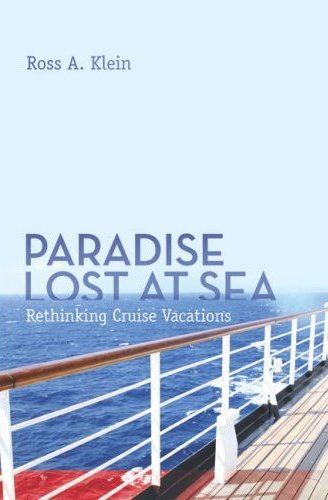If you have ever been on a cruise vacation and still have fond memories of the experience then do not read this book. Otherwise, Ross Klein’s Paradise Lost at Sea is a rich read that will likely deter you from cruising on your next vacation.
In less than 150 pages, Klein successfully reveals the underbelly of cruise ship vacations. Most vacationers are attracted to the easy excess of the affordable, all inclusive cruise ships getaways that offer both familiar comforts at sea and exotic port excursions on shore. However, Klein exposes the not so glamorous realities of sexual assault, environmental degradation, precarious health conditions and economic and labour exploitation that are complicit in the practice and nature of cruise vacations.
Amongst his well-cited sources, Klein uses interviews and legal briefs to narrate the story of passengers who have experienced horror stories on their cruise vacations. Cruise vacations, which are very similar to an all-inclusive resort at sea, bring together the excessive consumption of alcohol, food and entertainment but in a context that serves to blur understandings concerning applicable laws and the legal rights and responsibilities of the various parties involved.
There are several interviews with female passengers about being sexually assaulted by cruise ship crew members but having difficulty knowing who had legal jurisdiction to hear the case. Furthermore, even if the crew member is convicted of assault, there is no regulatory body that restricts the crew member from being hired at a different cruise-line.
Similarly, there are stories of passengers seeking medical care on board only to find out that there are no set standards for requiring qualified medical personnel on board. Several narratives illustrated the legal battles where passengers were wrongly diagnosed and left with life altering complications and even death. Passengers usually lost in these legal battles because jurisdictional questions — whether pertaining to the ship’s location at the time of the incident, the ship itself, its owners or its personnel — could not be determined.
To complicate matters, passengers often sign away their rights as soon as they get on the cruise ship. Vacationers rarely read the fine print; if they had, they would see that cruise lines have minimal responsibility over the people they employ and the way they may treat, assault or practice negligence towards passengers. Passengers are helpless once they are on board and have little legal recourse once wronged on or off the ship.
In addition to the documented abuses which occur on board, the cruising industry is a contributor to environmental degradation. Cruise ships carry with them mass amounts of resources which, at the end of the vacation, turns into mass amounts of waste. Cruise ships must excrete that waste and often it goes directly into the oceans. While there are big fines for this practice, cruise ships are still willing to take their chances as they dump sewage, hazardous waste and garbage into the sea.
Economic exploitation with punctuations of racialized and feminized hierarchies on board are also a central problem amongst crew members. Most crew members are from underdeveloped countries and, again, due to jurisdictional issues, minimum wages are not regulated. Most crew members that are service staff are also highly racialized and feminized and are kept at low-level positions. Abuse and assault toward low-level employees is common but unreported due to the highly precarious type of employment.
Paradise Lost at Sea is a short, but informative read. I would have easily dismissed Klein’s scare tactics for cruise vacationers if his book was not so well cited and well researched. Klein, a Professor of Social Work at Memorial University, boasts of experiencing 30 cruises worldwide (hopefully, his travels were for research purposes and not a sign of hypocrisy). For although Klein does an incredible job of disparaging even the thought of taking a cruise vacation, he does end with suggestions for passengers if they do decide to heed warning and take his facts for fables.
Klein warns possible cruise-goers to research cruise lines thoroughly. However the lack of watchdog agencies and the tempered standards for cruiselines to report human rights abuses like sexual harassment, economic exploitation of under-waged personnel or environmental impacts like waste creation and emissions make it considerably difficult for consumers to research ways to enjoy cruising in a responsible and ethical way. One suggestion that all of us are able to practice is reading the fine print. Too many vacationers sign away their rights when they agree to board the ship. It is not uncommon to book and pay for cruise vacations up to a year before the actual cruise and sign eagerly for the discounted prices. Invaluable advice is to read the fine print and ensure you know what you are getting into before you pay and before you board.
This is an excellent read for those who have experienced cruising, are interested in cruising or in researching unsustainable vacation practices.–Melissa Fong
Melissa Fong is a graduate student at the University of Toronto completing her thesis on anti-poverty social movements.




